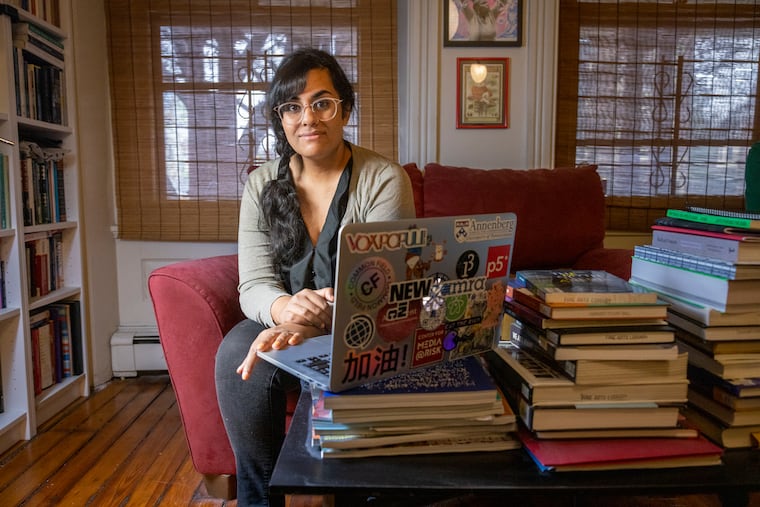‘Sluts Across America’ is back online, and its Philly-based creator is no longer anonymous
In what would've been 50 years of "Roe v. Wade," a Philly artist rallies support for reproductive freedom.

In 2022, Roopa Vasudevan felt a shift. The Supreme Court had overruled Roe v. Wade, and she immediately thought of “Sluts Across America,” the project she had anonymously created in 2012. The webpage had collected thousands of testimonials in support of contraception access but was now dead with outdated code. Frustrated and determined, Vasudevan reprogrammed and revived it.
“The Dobbs decision … is what lit the fire under me” to bring it back online, says Vasudevan, a West Philadelphia-based digital media artist and computer programmer who is currently pursuing her Ph.D. at Penn’s Annenberg School for Communication.
“Sluts Across America” was a platform where people wrote and read anonymous responses to the prompt, “I’m a slut because….” The entries were marked by location and placed on a map of the world.
In just two months, it gained nearly 9,000 entries from the U.S. and beyond. The site’s “About” section states: “If protecting ourselves makes us sluts, then it’s time to redefine what ‘slut’ actually means.” The unforgettable name stems from Rush Limbaugh’s incendiary screed against birth control advocate Sandra Fluke after she testified in Congress; he called her a “slut.” “The whole conversation read as absurd that we were making these value judgments on people who were actually taking a really proactive step in taking care of their own reproductive health,” says Vasudevan.
She created the webpage because she wanted to know “whether people were willing to self-identify as a slut, whether people were willing to kind of exist in solidarity with one another. It started as an experiment in collective storytelling [to illustrate] the diversity of reasons that people were asking for access to birth control,” she says.
“I love sex, but not kids.”
“I’m in charge of my future, not old straight Christian white men.”
“I support the right to control my body, my motherhood, and my endometriosis.”
“Sex is an important part of my life and I will pursue the pleasure of the experience without shame. And without having children I couldn’t possibly hope to adequately care for financially or otherwise.”
Contributors talked about not being ready to have children and how birth control regulates period cramps. They wrote about sexual liberation, medical necessity, and the principle of choosing for yourself. “It was really striking to see just how many of these contributions resonated with each other,” says Vasudevan. The silhouette symbol of a naked woman — a cheeky design choice — marked each entry’s location, and covered the map across the U.S., Europe, and elsewhere, with comments from people as far as New Zealand, South Africa, and Japan.
Then a master’s student at NYU’s Tisch School of the Arts, Vasudevan remained anonymous. “I was worried about right-wing blowback [and] people tracking me down or leveling threats,” she says. She’s still concerned about trolls but says, “this has garnered so many contributions, it’s been written about in books … I now feel more comfortable attaching myself to it as the artist … to give myself credit for all of that work that I did 10 years ago.”
This is the first time she’s identified herself as the artist in a major publication.
Vasudevan has been active in the city’s arts scene, with shows at Vox Populi, the artist-run space in Callowhill, and Automat, located in the Crane Arts building. Her work examines the ways that people engage with technology and interrogates how we unconsciously adopt default behaviors simply following, for example, Apple’s latest redesign.
Vasudevan credits “Sluts Across America” as one of her first successful art projects. “I really started to see myself as an artist, using the internet in order to foster solidarity and connection between people, which has been a recurring theme under a lot of my practice.”
It’s the hope for solidarity that underscores her motivation for bringing the project back online in 2023. If an abortion seeker in, say, Missouri feels especially isolated, they might find solace in hearing perspectives that affirm that decision from their neighbors. Vasudevan hopes that folks will continue contributing and using the page as a resource.
Roe v. Wade would have turned 50 years old this month. A decade ago, it would’ve been difficult to believe that the Supreme Court would go against established precedent. “In 2012, we took the right to get an abortion for granted, right? We took the right to contraception for granted,” says Vasudevan. “It becomes even more urgent to see something like [”Sluts Across America”] with the understanding that [reproductive rights are] not as set in stone as we would like to believe that they are … We have to really unite together as a group and show support for having access to reproductive freedom.”
Roopa Vasudevan’s “Slow Response I (Drawings), 2021-2022″ is on view at Annenberg School for Communication (3620 Walnut St.), 5th floor, through May 2023.